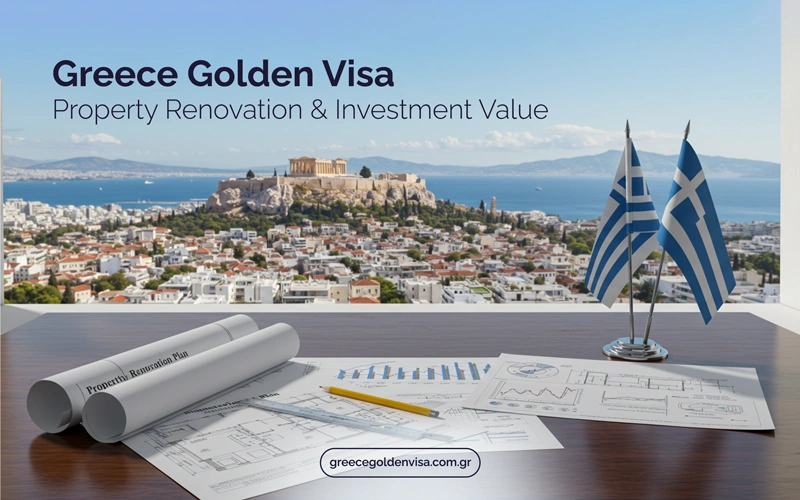for the strategic Golden Visa investor, the acquisition of a Greek property is not the final chapter; it is the beginning of the value creation process. While a prime location provides a solid foundation, it is through intelligent and targeted property renovation that the true financial potential of your asset is unlocked.
A well-executed renovation is the single most powerful tool an investor has to significantly increase a property’s capital value, maximize its rental income, and elevate its position in a competitive market.
This guide provides a definitive framework for transforming your Greek property from a simple qualifying asset into a high-performance investment. We will move beyond aesthetics to analyze renovation as a business decision, focusing on measurable ROI.
We will explore specific strategies tailored to different investment goals—from maximizing Airbnb returns to achieving the highest possible resale price—and outline the process for managing a project successfully from abroad. This is the blueprint for turning potential into profit and ensuring your Greek investment works as hard as you do.
The Value-Add Investor’s Brief: High-ROI Renovation Projects
- The Core Two: Kitchens & Bathrooms: Modernizing these essential spaces offers the highest and most reliable return on investment. They are the primary drivers of perceived value for both renters and future buyers.
- Create Open-Plan Living: Removing non-structural walls to combine the kitchen, living, and dining areas creates a sense of space and light that is highly desirable in the modern market.
- Energy Efficiency Upgrades: Investing in new, high-quality double-glazed windows and modernizing heating/cooling systems reduces running costs (a major plus for tenants) and increases the asset’s long-term value.
- Enhance Outdoor Spaces: In Greece, outdoor living is paramount. Upgrading a balcony, terrace, or garden with attractive flooring, shading, and seating can dramatically increase the property’s appeal and rental rate.
The Strategic Case for Renovation in the Greek Market
Much of the housing stock in prime Greek urban centers like Athens dates from the 1960s to the 1980s. While often structurally excellent, these properties feature dated layouts, electrical systems, and finishes. This presents a clear opportunity for the “value-add” investor. By acquiring a well-located but unmodernized property, you can invest in its transformation, bringing it up to 2025 luxury standards. The end result is an asset whose final market value is significantly greater than the sum of its purchase price and renovation costs.
Defining Your Goal: Tailoring the Renovation Strategy
A successful renovation begins with a clear objective. The right strategy depends on your primary goal for the property.
Strategy 1: Renovating for Maximum Rental Yield (The Airbnb Model)
- Focus: Aesthetics, durability, and photogenic “wow” factors.
- Tactics: Create an “Instagrammable” feature wall. Invest in stylish, but highly durable, furniture. Ensure excellent Wi-Fi, smart TV, and a well-equipped kitchen. Use robust materials that can withstand high turnover. The design should be modern and universally appealing.
Strategy 2: Renovating for Capital Appreciation & Resale (The Long-Term Hold/Flip)
- Focus: Timeless quality, high-end finishes, and structural improvements.
- Tactics: Invest in premium materials like hardwood or high-quality tiles. Install branded European kitchen appliances. Reconfigure the layout for optimal flow. Focus on classic, neutral color palettes that appeal to a broad range of potential buyers.
Strategy 3: Renovating for Personal Luxury & Lifestyle
- Focus: Bespoke features, ultimate comfort, and personal taste.
- Tactics: This is where you can indulge in custom cabinetry, highly specific design choices, home automation systems, and unique materials that reflect your personal vision. The ROI is measured primarily in personal enjoyment rather than financial metrics.
High-Impact Renovations: Where to Invest for the Best ROI
Not all renovation spending is created equal. Focus your capital on projects that deliver the most value.
The Kitchen and Bathrooms: The Heart of Value
These are the most scrutinized areas of any property. A modern, functional, and aesthetically pleasing kitchen is a non-negotiable for achieving a premium price or rental rate. Similarly, clean, modern bathrooms with quality fixtures can single-handedly elevate an older apartment.
Creating Open-Plan Living Spaces
Older Greek apartments often have small, separated rooms. Hiring a civil engineer to identify and remove non-load-bearing walls can transform a cramped layout into a bright, airy, and modern open-plan living area, fundamentally changing the character and perceived size of the property.
Energy Efficiency Upgrades: A Dual Benefit
Upgrading to modern, aluminum-framed, double-glazed windows and installing energy-efficient air conditioning units offers a double return. It makes the property more attractive and cheaper to run for tenants, and it increases its official Energy Performance Certificate (EPC) rating, which is a key factor in its long-term value.
Assembling Your Professional Renovation Team
For a non-resident investor, your professional team on the ground is your most critical asset.
- The Architect / Interior Designer: Your creative and technical lead. They will create the design concept, produce the technical drawings, help select materials, and, crucially, navigate the building permit process.
- The Civil Engineer: Essential for any structural changes. They will conduct a structural survey, confirm which walls can be removed, and provide the necessary sign-offs for the permit application.
- The Contractor (General Builder): The team that executes the vision. Choosing a reputable, reliable contractor with a portfolio of quality work and good references is paramount. Your architect can often help manage the selection and oversight of the contractor.
Navigating the Renovation Process from Abroad
- Define the Vision: Work with your architect remotely to define the scope, style, and budget.
- Permitting: Your architect and engineer will handle the entire permit application process with the local authorities. This can take several months.
- Appoint a Project Manager: Your architect can often serve as your project manager, overseeing the contractor, providing regular photo/video updates, and ensuring quality control. This is your eyes and ears on the ground.
- Manage Payments: Set up a clear payment schedule tied to specific project milestones. Never pay for the entire project upfront. Use a Greek bank account for transparent, traceable payments.
- Final Inspection: Plan a trip to Greece for the final handover, or have your trusted legal or technical representative conduct the final inspection on your behalf before making the final payment.
The Path Forward: From Potential to Profitability
A property renovation is a proactive investment in your asset’s future. It is the most effective way to take control of its performance, increase its value, and ensure it stands out in a competitive market. It transforms your Golden Visa from a simple residency tool into a dynamic and profitable enterprise.
A successful renovation project begins with a clear vision and a trusted professional team. To connect you with our network of vetted architects, engineers, and contractors in Greece, schedule a consultation to discuss your project.
The Renovating Investor’s Frequently Asked Questions (FAQs)
- What is the approximate cost for a full apartment renovation in Athens in 2025?
- Costs vary widely, but a high-quality, full renovation of an older apartment (including new kitchen, bathroom, flooring, windows, electrical, and plumbing) typically ranges from €800 to €1,500 per square meter. A 100 sq.m. apartment could therefore cost €80,000 – €150,000 to fully modernize.
- Do I need a building permit for my renovation?
- For minor cosmetic changes (painting, changing flooring), no. For any work involving internal wall changes, plumbing/electrical modifications, or altering the exterior of the building, a building permit (adeia) from the local municipal authority is legally required. Your architect and engineer are responsible for this process.
- How do I manage payments to contractors from abroad safely?
- The safest method is to have a milestone-based payment contract drafted by your lawyer. Payments are released from your Greek bank account only after your project manager/architect has verified that a specific stage of work has been completed to the required standard.
- How long does a typical full apartment renovation take?
- Excluding the permitting phase, the actual construction for a full 100 sq.m. apartment renovation typically takes 3 to 5 months, depending on the complexity of the work.
- What are the key durable materials to use for a high-traffic rental property?
- Focus on quality and durability. Choose high-quality porcelain or ceramic tiles over delicate hardwood for flooring. Use quartz or granite countertops in the kitchen instead of more porous marble. Select durable, stain-resistant fabrics for furniture and invest in robust, easy-to-use appliances.
 Greece — +30 698 557 8998
Greece — +30 698 557 8998
 Turkey — +90 506 022 30 00
Turkey — +90 506 022 30 00
 UAE — +971 52 913 5599
UAE — +971 52 913 5599
 Egypt — +20 110 114 9411
Egypt — +20 110 114 9411





